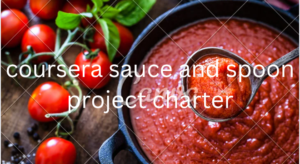coursera sauce and spoon project charter
The Sauce & Spoon project, as outlined in the Google Project Management Capstone course, focuses on implementing tabletop menu tablets to enhance customer experience and operational efficiency. This initiative aims to decrease table turn times, increase average check values, and reduce food waste. The project charter serves as a foundational document that aligns stakeholders on the project’s objectives, scope, deliverables, and anticipated benefits.

“coursera sauce and spoon project charter”
Project Summary
Sauce & Spoon plans to pilot the rollout of tabletop menu tablets in the bar sections of two restaurant locations: Sauce & Spoon North and Sauce & Spoon Downtown. This initiative is designed to streamline the ordering process, allowing guests to place orders directly from their tables, thereby reducing wait times and enhancing the dining experience. The pilot will provide valuable data to inform a potential broader implementation across all locations.
Project Goals
The primary goals of the project are:
Decrease Table Turn Time: Reduce the average table turn time by 30 minutes by the end of the second quarter.
Increase Average Check Value: Elevate the average check value from $65 to $75 by promoting additional items such as appetizers and specialty beverages through the tablet interface.
Reduce Food Waste: Cut food waste by 25% by the end of the second quarter through more accurate order placements and real-time inventory updates.
Enhance Customer Satisfaction: Improve overall customer satisfaction scores by providing a modern and efficient ordering experience.
Deliverables
The project will result in the following key deliverables:
Tabletop Menu Tablets: Installation of user-friendly, durable tablets in the bar sections of the two selected locations.
Integrated Ordering System: A seamless integration of the tablets with the existing Point of Sale (POS) system to ensure accurate and efficient order processing.
Staff Training Program: Comprehensive training sessions for staff to effectively use and assist customers with the new tablet system.
Customer Feedback Mechanism: Implementation of a system to collect and analyze customer feedback on the tablet ordering experience to inform future improvements.
Project Scope
The scope of this pilot project includes:
Locations: Implementation at Sauce & Spoon North and Sauce & Spoon Downtown.
Areas: Installation of tablets exclusively in the bar sections of the selected locations.
Duration: The pilot will run until the end of the second quarter, with ongoing monitoring and evaluation.
Exclusions: The pilot does not include tablet installation in the main dining areas or other locations at this stage.
Benefits
Anticipated benefits of the project include:
Operational Efficiency: Faster table turnover and reduced wait times leading to the ability to serve more guests.
Increased Revenue: Higher average check values through the promotion of additional items and efficient ordering.
Customer Satisfaction: Enhanced dining experience resulting in improved customer satisfaction and loyalty.
Data Insights: Collection of valuable data on customer preferences and ordering patterns to inform future business decisions.
Costs
The estimated costs for the pilot project are:
Hardware and Software: $40,000 for the purchase and installation of tablets and necessary software integration.
Training: $5,000 for developing and conducting staff training programs.
Maintenance: $5,000 allocated for ongoing maintenance and technical support during the pilot phase.
Contingency: $3,000 reserved for unforeseen expenses.
Total Estimated Cost: $53,000.
Stakeholders
Key stakeholders involved in the project include:
Project Sponsor: Sauce & Spoon Executive Team.
Project Manager: Assigned individual responsible for overseeing the project from initiation to closure.
Restaurant Managers: Managers of the North and Downtown locations who will facilitate on-site implementation.
IT Department: Team responsible for technical aspects, including tablet setup and POS integration.
Staff Members: Employees who will interact with the tablets and assist customers.
Customers: Patrons who will use the tablets and provide feedback on their experience.
Risks and Mitigation Strategies
Potential risks associated with the project and their mitigation strategies include:
Technical Issues: Risk of integration challenges between tablets and the POS system. Mitigation: Conduct thorough testing prior to launch and have IT support readily available.
Staff Resistance: Potential resistance from staff due to changes in workflow. Mitigation: Provide comprehensive training and highlight benefits to staff roles.
Customer Adaptation: Customers may be hesitant to use the new technology. Mitigation: Ensure staff are trained to assist and encourage customers, and provide alternative ordering methods if needed.
Cost Overruns: Unexpected expenses exceeding the budget. Mitigation: Maintain a contingency fund and monitor expenditures closely.
External linkhttps://www.scribd.com/document/521677584/Project-Charter-Sauce-and-Spoon
Internal linkhttps://techbiox.com/facebook-type-edit-not-working/
Conclusion
The Sauce & Spoon tabletop menu tablet project is a strategic initiative aimed at enhancing operational efficiency, increasing revenue, and improving customer satisfaction. By piloting this technology in select locations, Sauce & Spoon can assess its effectiveness and make informed decisions about broader implementation. The project charter provides a clear roadmap, aligning all stakeholders on the objectives, scope, deliverables, and anticipated benefits, setting the foundation for successful project execution.

